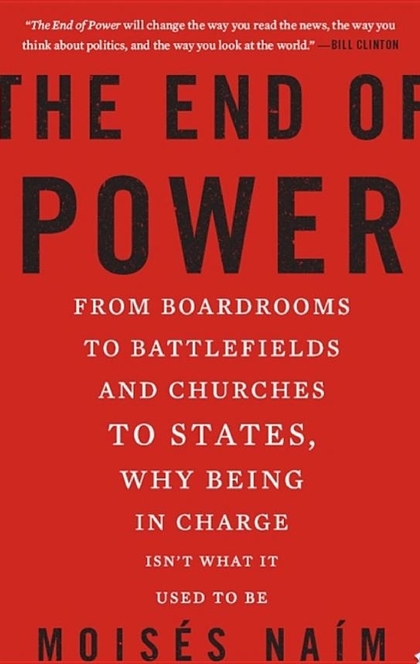
22 Mark Zuckerberg's Favorite Books
Mark Zuckerberg
Curious about the books Mark Zuckerberg reads? Here is the full list of Mark Zuckerberg book recommendations.
See all
0
likes
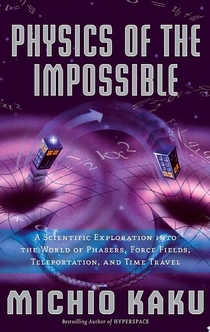
Physics of the Impossible
Teleportation, time machines, force fields, and interstellar space ships—the stuff of science fiction or potentially attainable future technologies? Inspired by the fantastic worlds of Star Trek, Star Wars, and Back to the Future, renowned theoretical physicist and bestselling author Michio Kaku takes an informed, serious, and often surprising look at what our current understanding of the universe's physical laws may permit in the near and distant future.Entertaining, informative, and imaginative, Physics of the Impossible probes the very limits of human ingenuity and scientific possibility.
See all
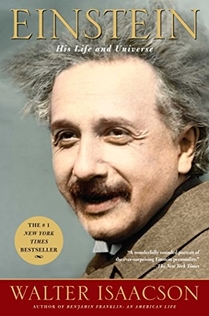
Einstein
NOW A MAJOR SERIES 'GENIUS' ON NATIONAL GEOGRAPHIC, PRODUCED BY RON HOWARD AND STARRING GEOFFREY RUSHEinstein is the great icon of our age: the kindly refugee from oppression whose wild halo of hair, twinkling eyes, engaging humanity and extraordinary brilliance made his face a symbol and his name a synonym for genius. He was a rebel and nonconformist from boyhood days. His character, creativity and imagination were related, and they drove both his life and his science. In this marvellously clear and accessible narrative, Walter Isaacson explains how his mind worked and the mysteries of the universe that he discovered. Einstein's success came from questioning conventional wisdom and marvelling at mysteries that struck others as mundane. This led him to embrace a worldview based on respect for free spirits and free individuals. All of which helped make Einstein into a rebel but with a reverence for the harmony of nature, one with just the right blend of imagination and wisdom to transform our understanding of the universe. This new biography, the first since all of Einstein's papers have become available, is the fullest picture yet of one of the key figures of the twentieth century. This is the first full biography of Albert Einstein since all of his papers have become available -- a fully realised portrait of this extraordinary human being, and great genius.Praise for EINSTEIN by Walter Isaacson:- 'YOU REALLY MUST READ THIS.' Sunday Times 'As pithy as Einstein himself.’ New Scientist ‘[A] brilliant biography, rich with newly available archival material.’ Literary Review ‘Beautifully written, it renders the physics understandable.’ Sunday Telegraph ‘Isaacson is excellent at explaining the science. ' Daily Express
See all

Decoded
In this groundbreaking book Phil Barden reveals what decision science explains about people’s purchase behaviour, and specifically demonstrates its value to marketing. He shares the latest research on the motivations behind consumers’ choices and what happens in the human brain as buyers make their decisions. He deciphers the ‘secret codes’ of products, services and brands to explain why people buy them. And finally he shows how to apply this knowledge in day to day marketing to great effect by dramatically improving key factors such as relevance, differentiation and credibility. Shows how the latest insights from the fields of Behavioural Economics, psychology and neuro-economics explain why we buy what we buy Offers a pragmatic framework and guidelines for day-to-day marketing practice on how to employ this knowledge for more effective brand management - from strategy to implementation and NPD. The first book to apply Daniel Kahneman’s Nobel Prize-winning work to marketing and advertising Packed with case studies, this is a must-read for marketers, advertising professionals, web designers, R&D managers, industrial designers, graphic designers in fact anyone whose role or interest focuses on the ‘why’ behind consumer behaviour. Foreword by Rory Sutherland, Executive Creative Director and Vice-Chairman, OgilvyOne London and Vice-Chairman,Ogilvy Group UK Full colour throughout
See all
"Surely You're Joking, Mr. Feynman!": Adventures of a Curious Character
One of the most famous science books of our time, the phenomenal national bestseller that "buzzes with energy, anecdote and life. It almost makes you want to become a physicist" (Science Digest). Richard P. Feynman, winner of the Nobel Prize in physics, thrived on outrageous adventures. In this lively work that “can shatter the stereotype of the stuffy scientist” (Detroit Free Press), Feynman recounts his experiences trading ideas on atomic physics with Einstein and cracking the uncrackable safes guarding the most deeply held nuclear secrets—and much more of an eyebrow-raising nature. In his stories, Feynman’s life shines through in all its eccentric glory—a combustible mixture of high intelligence, unlimited curiosity, and raging chutzpah. Included for this edition is a new introduction by Bill Gates.
See all
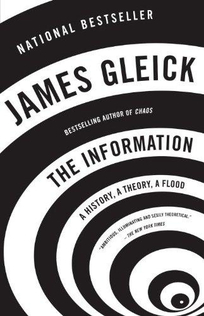
The Information
From the bestselling author of the acclaimed Chaos and Genius comes a thoughtful and provocative exploration of the big ideas of the modern era: Information, communication, and information theory. Acclaimed science writer James Gleick presents an eye-opening vision of how our relationship to information has transformed the very nature of human consciousness. A fascinating intellectual journey through the history of communication and information, from the language of Africa’s talking drums to the invention of written alphabets; from the electronic transmission of code to the origins of information theory, into the new information age and the current deluge of news, tweets, images, and blogs. Along the way, Gleick profiles key innovators, including Charles Babbage, Ada Lovelace, Samuel Morse, and Claude Shannon, and reveals how our understanding of information is transforming not only how we look at the world, but how we live.A New York Times Notable BookA Los Angeles Times and Cleveland Plain Dealer Best Book of the YearWinner of the PEN/E. O. Wilson Literary Science Writing Award
See all

Open
#1 NATIONAL BESTSELLERFar more than a superb memoir about the highest levels of professional tennis, Open is the engrossing story of a remarkable life. Andre Agassi had his life mapped out for him before he left the crib. Groomed to be a tennis champion by his moody and demanding father, by the age of twenty-two Agassi had won the first of his eight grand slams and achieved wealth, celebrity, and the game’s highest honors. But as he reveals in this searching autobiography, off the court he was often unhappy and confused, unfulfilled by his great achievements in a sport he had come to resent. Agassi writes candidly about his early success and his uncomfortable relationship with fame, his marriage to Brooke Shields, his growing interest in philanthropy, and—described in haunting, point-by-point detail—the highs and lows of his celebrated career.
See all
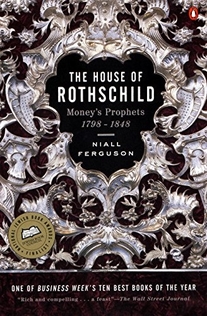
The House of Rothschild
Ever since the house of Rothschild first rose to pre-eminence in the turbulent era of the Napoleonic wars, mythology has surrounded the family and its firms. Conservative aristocrats, radical democrats, socialists from Marx onwards, anti-semites from Wagner to Hitler - all have reserved a special place in their critiques of modern capitalism for the Rothschilds. They have been portrayed as the power behind not just one throne but many. They have been charged with financing revolutions and counter-revolutions. They have been seen as the final arbiters of war and peace in Europe. This book is the first of two volumes presenting a history of the house of Rothschild that reveals the phenomenal economic success of this secretive family.
See all

American Lion
The definitive biography of a larger-than-life president who defied norms, divided a nation, and changed Washington foreverAndrew Jackson, his intimate circle of friends, and his tumultuous times are at the heart of this remarkable book about the man who rose from nothing to create the modern presidency. Beloved and hated, venerated and reviled, Andrew Jackson was an orphan who fought his way to the pinnacle of power, bending the nation to his will in the cause of democracy. Jackson’s election in 1828 ushered in a new and lasting era in which the people, not distant elites, were the guiding force in American politics. Democracy made its stand in the Jackson years, and he gave voice to the hopes and the fears of a restless, changing nation facing challenging times at home and threats abroad. To tell the saga of Jackson’s presidency, acclaimed author Jon Meacham goes inside the Jackson White House. Drawing on newly discovered family letters and papers, he details the human drama–the family, the women, and the inner circle of advisers– that shaped Jackson’s private world through years of storm and victory. One of our most significant yet dimly recalled presidents, Jackson was a battle-hardened warrior, the founder of the Democratic Party, and the architect of the presidency as we know it. His story is one of violence, sex, courage, and tragedy. With his powerful persona, his evident bravery, and his mystical connection to the people, Jackson moved the White House from the periphery of government to the center of national action, articulating a vision of change that challenged entrenched interests to heed the popular will– or face his formidable wrath. The greatest of the presidents who have followed Jackson in the White House–from Lincoln to Theodore Roosevelt to FDR to Truman–have found inspiration in his example, and virtue in his vision. Jackson was the most contradictory of men. The architect of the removal of Indians from their native lands, he was warmly sentimental and risked everything to give more power to ordinary citizens. He was, in short, a lot like his country: alternately kind and vicious, brilliant and blind; and a man who fought a lifelong war to keep the republic safe–no matter what it took.
See all

XI JINPING: THE GOVERNANCE OF CHINA (I)(English version )
The first book ever published by a sitting Chinese President, Xi Jinping: The Governance of China Volume I offered a unique look inside the Communist Party of China and its leader's vision for the future. Since publication, Xi Jinping has continued to explore the governance of China in the new era, providing a series of new concepts, ideas and strategies which add further depth and innovation to the Party's theoretical base.
See all

The Structure of Scientific Revolutions
"A landmark in intellectual history which has attracted attention far beyond its own immediate field. . . . It is written with a combination of depth and clarity that make it an almost unbroken series of aphorisms. . . . Kuhn does not permit truth to be a criterion of scientific theories, he would presumably not claim his own theory to be true. But if causing a revolution is the hallmark of a superior paradigm, [this book] has been a resounding success." --Nicholas Wade, Science "Perhaps the best explanation of [the] process of discovery." --William Erwin Thompson, New York Times Book Review "Occasionally there emerges a book which has an influence far beyond its originally intended audience. . . . Thomas Kuhn's The Structure of Scientific Revolutions . . . has clearly emerged as just such a work." --Ron Johnston, Times Higher Education Supplement "Among the most influential academic books in this century." --Choice One of "The Hundred Most Influential Books Since the Second World War," Times Literary Supplement
See all
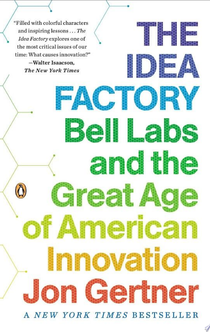
The Idea Factory
The definitive history of America’s greatest incubator of innovation and the birthplace of some of the 20th century’s most influential technologiesFrom its beginnings in the 1920s until its demise in the 1980s, Bell Labs-officially, the research and development wing of AT&T-was the biggest, and arguably the best, laboratory for new ideas in the world. From the transistor to the laser, from digital communications to cellular telephony, it's hard to find an aspect of modern life that hasn't been touched by Bell Labs. In The Idea Factory, Jon Gertner traces the origins of some of the twentieth century's most important inventions and delivers a riveting and heretofore untold chapter of American history. At its heart this is a story about the life and work of a small group of brilliant and eccentric men-Mervin Kelly, Bill Shockley, Claude Shannon, John Pierce, and Bill Baker-who spent their careers at Bell Labs. Today, when the drive to invent has become a mantra, Bell Labs offers us a way to enrich our understanding of the challenges and solutions to technological innovation. Here, after all, was where the foundational ideas on the management of innovation were born.
See all

The Beginning of Infinity
The New York Times bestseller: A provocative, imaginative exploration of the nature and progress of knowledge“Dazzling.” – Steven Pinker, The GuardianIn this groundbreaking book, award-winning physicist David Deutsch argues that explanations have a fundamental place in the universe—and that improving them is the basic regulating principle of all successful human endeavor. Taking us on a journey through every fundamental field of science, as well as the history of civilization, art, moral values, and the theory of political institutions, Deutsch tracks how we form new explanations and drop bad ones, explaining the conditions under which progress—which he argues is potentially boundless—can and cannot happen. Hugely ambitious and highly original, The Beginning of Infinity explores and establishes deep connections between the laws of nature, the human condition, knowledge, and the possibility for progress.
See all
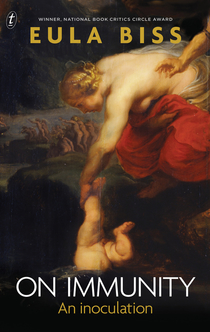
On Immunity
A New York Times Best SellerA National Book Critics Circle Award FinalistA New York Times Book Review Top 10 Book of the YearA Facebook "Year of Books" SelectionOne of the Best Books of the Year* National Book Critics Circle Award finalist * The New York Times Book Review (Top 10) * Entertainment Weekly (Top 10) * New York Magazine (Top 10)* Chicago Tribune (Top 10) * Publishers Weekly (Top 10) * Time Out New York (Top 10) * Los Angeles Times * Kirkus * Booklist * NPR's Science Friday * Newsday * Slate * Refinery 29 * And many more...Why do we fear vaccines? A provocative examination by Eula Biss, the author of Notes from No Man's Land, winner of the National Book Critics Circle AwardUpon becoming a new mother, Eula Biss addresses a chronic condition of fear-fear of the government, the medical establishment, and what is in your child's air, food, mattress, medicine, and vaccines. She finds that you cannot immunize your child, or yourself, from the world. In this bold, fascinating book, Biss investigates the metaphors and myths surrounding our conception of immunity and its implications for the individual and the social body. As she hears more and more fears about vaccines, Biss researches what they mean for her own child, her immediate community, America, and the world, both historically and in the present moment. She extends a conversation with other mothers to meditations on Voltaire's Candide, Bram Stoker's Dracula, Rachel Carson's Silent Spring, Susan Sontag's AIDS and Its Metaphors, and beyond. On Immunity is a moving account of how we are all interconnected-our bodies and our fates.
See all

The Player Of Games
The second Culture novel from the awesome imagination of Iain M. Banks, a modern master of science fiction.The Culture - a human/machine symbiotic society - has thrown up many great Game Players, and one of the greatest is Gurgeh. Jernau Morat Gurgeh. The Player of Games. Master of every board, computer and strategy.Bored with success, Gurgeh travels to the Empire of Azad, cruel and incredibly wealthy, to try their fabulous game ... a game so complex, so like life itself, that the winner becomes emperor. Mocked, blackmailed, almost murdered, Gurgeh accepts the game, and with it the challenge of his life - and very possibly his death.Praise for the Culture series:'Epic in scope, ambitious in its ideas and absorbing in its execution' Independent on Sunday'Banks has created one of the most enduring and endearing visions of the future' Guardian'Jam-packed with extraordinary invention' Scotsman'Compulsive reading' Sunday Telegraph The Culture series:Consider PhlebasThe Player of GamesUse of WeaponsThe State of the ArtExcessionInversionsLook to WindwardMatterSurface DetailThe Hydrogen SonataOther books by Iain M. Banks:Against a Dark BackgroundFeersum EndjinnThe Algebraist
See all

Rational Ritual
Why do Internet, financial service, and beer commercials dominate Super Bowl advertising? How do political ceremonies establish authority? Why does repetition characterize anthems and ritual speech? Why were circular forms favored for public festivals during the French Revolution? This book answers these questions using a single concept: common knowledge. Game theory shows that in order to coordinate its actions, a group of people must form "common knowledge." Each person wants to participate only if others also participate. Members must have knowledge of each other, knowledge of that knowledge, knowledge of the knowledge of that knowledge, and so on. Michael Chwe applies this insight, with striking erudition, to analyze a range of rituals across history and cultures. He shows that public ceremonies are powerful not simply because they transmit meaning from a central source to each audience member but because they let audience members know what other members know. For instance, people watching the Super Bowl know that many others are seeing precisely what they see and that those people know in turn that many others are also watching. This creates common knowledge, and advertisers selling products that depend on consensus are willing to pay large sums to gain access to it. Remarkably, a great variety of rituals and ceremonies, such as formal inaugurations, work in much the same way. By using a rational-choice argument to explain diverse cultural practices, Chwe argues for a close reciprocal relationship between the perspectives of rationality and culture. He illustrates how game theory can be applied to an unexpectedly broad spectrum of problems, while showing in an admirably clear way what game theory might hold for scholars in the social sciences and humanities who are not yet acquainted with it. In a new afterword, Chwe delves into new applications of common knowledge, both in the real world and in experiments, and considers how generating common knowledge has become easier in the digital age.
See all
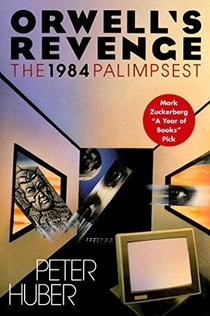
Orwell's Revenge
Mark Zuckerberg's ‘A Year of Books’ Selection George Orwell’s bleak visions of the future, one in which citizens are monitored through telescreens by an insidious Big Brother, has haunted our imagination long after the publication of 1984. Orwell’s dystopian image of the telescreen as a repressive instrument of state power has profoundly affected our view of technology, posing a stark confrontational question: Who will be master, human or machine? Experience has shown, however, that Orwell’s vision of the future was profoundly and significantly wrong: The conjunction of the new communications technologies has not produced a master-slave relation between person and computer, but rather exciting possibilities for partnership. In an extraordinary demonstration of the emerging supermedium's potential to engender new forms of creativity, Huber’s book boldly reimagines 1984 from the computer's point of view. After first scanning all of Orwell’s writings into his personal computer, Huber used the machine to rewrite the book completely, for the most part using Orwell’s own language. Alternating fiction and non-fiction chapters, Huber advances Orwell’s plot to a surprising new conclusion while seamlessly interpolating his own explanations and arguments. The result is a fascinating utopian work which envisions a world at our fingertips of ever-increasing information, equal opportunity, and freedom of choice.
See all

Energy
In this user-friendly and informative book, prolific author and academic Vaclav Smil provides an introduction to this far-reaching term and gives the reader a greater understanding of energy's place in both past and present society. Starting with an explanation of the concept, he goes on to cover such exciting topics as the inner workings of the human body, and the race for more efficient and environmentally friendly fuels. Whether you're after insight or dinner table conversation, Energy: A Beginner's Guide will amaze and inform, uncovering the science behind one of the most important concepts in our universe.
See all

The Three-Body Problem
"Wildly imaginative, really interesting." —President Barack Obama on The Three-Body Problem trilogyThe Three-Body Problem is the first chance for English-speaking readers to experience the Hugo Award-winning phenomenon from China's most beloved science fiction author, Liu Cixin.Set against the backdrop of China's Cultural Revolution, a secret military project sends signals into space to establish contact with aliens. An alien civilization on the brink of destruction captures the signal and plans to invade Earth. Meanwhile, on Earth, different camps start forming, planning to either welcome the superior beings and help them take over a world seen as corrupt, or to fight against the invasion. The result is a science fiction masterpiece of enormous scope and vision.The Remembrance of Earth's Past TrilogyThe Three-Body ProblemThe Dark ForestDeath's EndOther BooksBall Lightning (forthcoming)At the Publisher's request, this title is being sold without Digital Rights Management Software (DRM) applied.
See all

The Better Angels of Our Nature
“If I could give each of you a graduation present, it would be this—the most inspiring book I've ever read."—Bill Gates (May, 2017)Selected by The New York Times Book Review as a Notable Book of the YearThe author of Enlightenment Now and The New York Times bestseller The Stuff of Thought offers a controversial history of violence.Faced with the ceaseless stream of news about war, crime, and terrorism, one could easily think we live in the most violent age ever seen. Yet as New York Times bestselling author Steven Pinker shows in this startling and engaging new work, just the opposite is true: violence has been diminishing for millenia and we may be living in the most peaceful time in our species's existence. For most of history, war, slavery, infanticide, child abuse, assassinations, programs, gruesom punishments, deadly quarrels, and genocide were ordinary features of life. But today, Pinker shows (with the help of more than a hundred graphs and maps) all these forms of violence have dwindled and are widely condemned. How has this happened?This groundbreaking book continues Pinker's exploration of the esesnce of human nature, mixing psychology and history to provide a remarkable picture of an increasingly nonviolent world. The key, he explains, is to understand our intrinsic motives--the inner demons that incline us toward violence and the better angels that steer us away--and how changing circumstances have allowed our better angels to prevail. Exploding fatalist myths about humankind's inherent violence and the curse of modernity, this ambitious and provocative book is sure to be hotly debated in living rooms and the Pentagon alike, and will challenge and change the way we think about our society.
See all

Dealing with China
The New York Times bestselling author of Dealing with China takes the reader behind closed doors to witness the creation and evolution and future of China's state-controlled capitalism. Hank Paulson has dealt with China unlike any other foreigner. As head of Goldman Sachs, Paulson had a pivotal role in opening up China to private enterprise. Then, as Treasury secretary, he created the Strategic Economic Dialogue with what is now the world's second-largest economy. He negotiated with China on needed economic reforms, while safeguarding the teetering U.S. financial system. Over his career, Paulson has worked with scores of top Chinese leaders, including Xi Jinping, China's most powerful man in decades. In Dealing with China, Paulson draws on his unprecedented access to modern China's political and business elite, including its three most recent heads of state, to answer several key questions: How did China become an economic superpower so quickly? How does business really get done there? What are the best ways for Western business and political leaders to work with, compete with, and benefit from China? How can the U.S. negotiate with and influence China given its authoritarian rule, its massive environmental concerns, and its huge population's unrelenting demands for economic growth and security? Written in the same anecdote-rich, page-turning style as Paulson's bestselling memoir, On the Brink, Dealing with China is certain to become the classic and definitive examination of how to engage China's leaders as they build their economic superpower.
See all

Genome
The genome's been mapped.But what does it mean?Arguably the most significant scientific discovery of the new century, the mapping of the twenty-three pairs of chromosomes that make up the human genome raises almost as many questions as it answers. Questions that will profoundly impact the way we think about disease, about longevity, and about free will. Questions that will affect the rest of your life.Genome offers extraordinary insight into the ramifications of this incredible breakthrough. By picking one newly discovered gene from each pair of chromosomes and telling its story, Matt Ridley recounts the history of our species and its ancestors from the dawn of life to the brink of future medicine. From Huntington's disease to cancer, from the applications of gene therapy to the horrors of eugenics, Matt Ridley probes the scientific, philosophical, and moral issues arising as a result of the mapping of the genome. It will help you understand what this scientific milestone means for you, for your children, and for humankind.
See all

The End of Power
The provocative bestseller explaining the decline of power in the twenty-first century -- in government, business, and beyond.Power is shifting -- from large, stable armies to loose bands of insurgents, from corporate leviathans to nimble start-ups, and from presidential palaces to public squares. But power is also changing, becoming harder to use and easier to lose. In The End of Power, award-winning columnist and former Foreign Policy editor Moisés Naím illuminates the struggle between once-dominant megaplayers and the new micropowers challenging them in every field of human endeavor. Drawing on provocative, original research and a lifetime of experience in global affairs, Naím explains how the end of power is reconfiguring our world."The End of Power will ... change the way you look at the world."--Bill Clinton"Extraordinary."--George Soros"Compelling and original."--Arianna Huffington"A fascinating new perspective...Naím makes eye-opening connections."--Francis FukuyamaInaugural Pick for Mark Zuckerberg's "Year of Books" Challenge * Financial Times Best Book of the Year * Washington Post Notable Book * Washington Post Nonfiction Bestseller
See all






